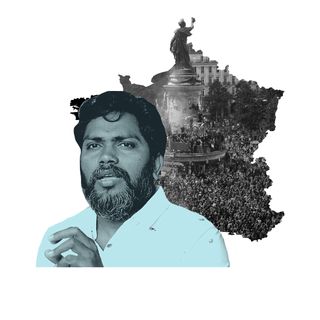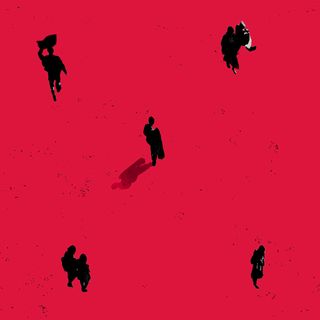
For Palestine — Love, Jamia Nagar
Amid rising global Islamophobia, a small Muslim locality in New Delhi stands in solidarity with Palestine.
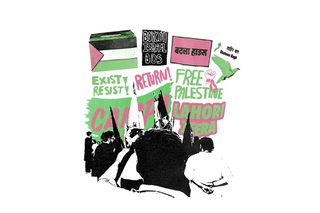


The Boycott, Divestment and Sanctions (BDS) movement, which began in 2005, calls for the boycotting of companies and institutions complicit in the violation of Palestinian human rights, withdrawing investment from Israel and international companies that support it, and sanctioning campaigns to end the apartheid regime.
The locus of India’s solidarity with Palestine has now shrunk to a few small regions: Jamia Nagar being one of them. Jamia Nagar is a cluster of small and big localities in Southeast Delhi, mainly Batla House, Zakir Nagar, Ghaffar Manzil, Noor Nagar, Abul Fazal Enclave and, notably, Shaheen Bagh.


Ballimaran Nahari is a popular local business that sells the slow-cooked meat dish nihari. Zaidi’s restaurant is one of many in Jamia Nagar who have removed pro-Israel products from their counters. They stopped serving drinks on the BDS list in October 2023, and switched to “Lahori Zeera,” produced in Chandigarh. “We cannot turn a blind eye to the plight of the Palestinians... At our shop, we not only boycott but our waiters also actively try to educate the guests about the reasons for our boycotting these brands,” Zaidi explains.
In her book Accumulation by Segregation: Muslim Localities in Delhi, Professor Ghazala Jamil describes the Batla House market in Jamia Nagar as “a thriving, bustling witness to small joys of finding cheap and not-so-cheap delights of urban consumerist aspirations.” An anti-imperialist imagination produced community-run businesses of clothes, footwear, cosmetics, household items, restaurants, and cafes — all a result of ghettoisation, and multinational corporations' reluctance to set up franchises in a Muslim ghetto. But with these brands enumerated in the BDS list anyway, Jamia Nagar’s kitschy knock-off culture was already prepared to answer the call. Consider "FKC" — Fazal says that he too explains the BDS movement to customers when they ask for boycotted items. The effort comes from "a sense of brotherhood, quamiyat towards Palestine," he says, since "it’s our Muslim quam [community] who are suffering.
The community, for their part, has no need for multinational corporate brands.


Are the small, symbolic acts of boycott enough? “There is no economics devoid of politics”, Ali Javed, the founder and CEO of think-tank media firm The Nous Network, explains. Globally, the BDS movement has achieved a lot as a decolonial framework of resistance against Israel and the forces that harbour it. However, he says that the limitation lies in the lack of policy-level interventions from Muslim nations at the global level. Larger Muslim nation-states, such as Saudi Arabia, UAE, Turkey, Egypt, and Jordan continue to maintain ties with Israel. Thus, the BDS movement has been successful only to a certain extent.
In the meantime, small communities do their best. Aamir Pathan, the owner of Javed Famous Nahari restaurant located at the bustling Chalis Futa Road in Shaheen Bagh, has been actively participating in the boycott. He believes that people from all communities should unite in solidarity with the Palestinians. But try as he might, he has not been successful in fully taking products on the boycott list off his shelves and menus.
“There are different types of customers who come in. Some of them demand Coca-Cola and Pepsi... I did keep alternate products for sale like Shikanji soda, but they didn't sell at all”, Aamir laments. He's not the only one. The manager of a provisions store in Noor Nagar says, “if a particular product does not get sold within a week, we stop restocking it. The people must be willing to stop purchasing a product for the boycott to succeed. Otherwise, it is pointless." “How many products will you boycott after all, since these powerful MNCs own 80% of products worldwide?” he continues.
Still, others do what they can.


“It is not something I look forward to doing," says the resident organizing the fundraiser. "I do not want that in a world where billionaires exist, where there is so much money with Muslims, and I have to put in efforts, keep reminding people that there are starving children across the world... We should have done something more." Still, besides her own effort, she knows other young women who collect money in hostel dorm rooms; some who work part-time and only earn about 3,000 rupees, but donate 500 rupees. One chemist in Jamia Nagar even offered free medication to Palestinians in Delhi.
She reminds us, “As Muslims, we should be united, and we should participate in such movements against injustice. We should not think of our own benefits."


The connection between Jamia Nagar and Palestine has always felt intuitive to the area's politics. Usmani recollects an incident in 2008, when a person was arrested on terror charges for burning the Israeli flag in front of the Israeli embassy. He was jailed for four years.
Nafis Haider, a research scholar who frequents Jamia Nagar, says that the Palestinian genocide is much more than a mere geopolitical issue. "It has become an issue of Islamophobia at its height," Haider notes. He evokes Hannah Arendt's famous quote — "if one is attacked as a Jew, one must defend oneself as a Jew" — to draw attention to the way that the West demonizes the Palestinian cause based on their identity. "It is important that Jamia Nagar, with its massive Muslim population, supports BDS and shows solidarity, not just in name but also through something of tangible value," he adds.


Arafat famously called former Indian Prime Minister Indira Gandhi his ‘elder sister.’ In 1981, India even released a commemorative stamp in honour of the Palestinian people. However, the post-liberalisation era marked the establishment of full diplomatic relations between India and Israel in 1992, and a slow erosion of support for Palestinian statehood, as Azad Essa noted in his recent book Hostile Homelands: The New Alliance Between India and Israel. In 2009, India donated $10 million USD to the Palestinian National Authority. Today, the Indian government exports drones to Israel; while Indian social media accounts are also pushing anti-Palestinian disinformation.
The trajectory of India's faltering support for Palestine thus mirrors its growing hostility toward Indian Muslims — which came to a head during the CAA-NRC legislations of 2019. The ongoing movement in Jamia Nagar, then, is a matter of the community responding to attacks on their own identity as Indian Muslims.


According to Parveen, Muslim ilaqe in postcolonial North India are cultural spaces where historically evolved Islamic practices and customs are performed. But the mainstream media often portrays them as polluted spaces or ghettos — framed as obstacles to planning and modernisation, and also as hubs of criminal activity and terrorist hideouts. The derogatory ‘miniature Pakistan’ verbiage targets the fact that minority politics are nurtured in these spaces.
But beyond the identity-based mobilization for Palestine, one might argue that Jamia Nagar’s boycott isn’t only transnational politics but also transnational spirituality. Ali Javed says that religious morality is shaping this movement.
“Islam has a clear framework of morality on what should be done and what not," he explains, vis-a-vis the BDS framework of resistance. The religion advocates for Zakat, Sadqa (charity), and Khums (a fifth of earnings) — radical redistributive measures that can address inequality, just like any other social movement. This is where Islam plays a role in calling upon the community to come together against any form of injustice.
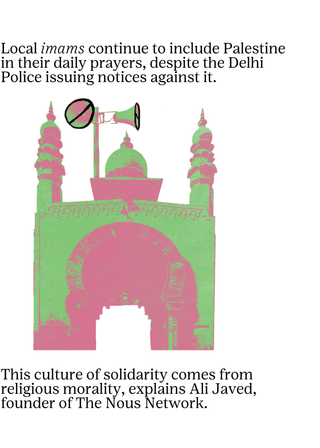
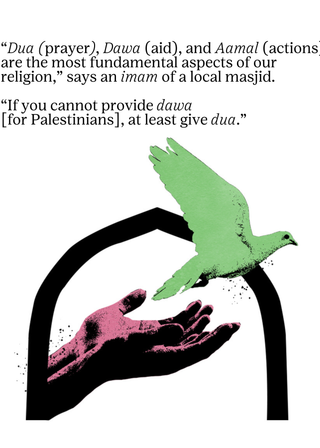
Karthika Jayakumar is an independent researcher based out of New Delhi. Abdullah Kazmi is a mass media educator based out of New Delhi.
Related

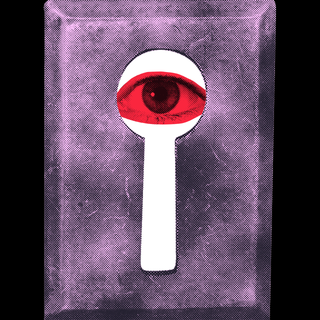
Voyeur Nation
